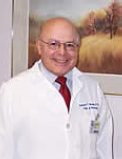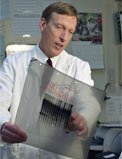A Reflection on the Increasing Importance of Private Capital in Medical Research
Wednesday, October 15, 2014
Private philanthropic foundations are emerging as a revolutionary source of innovative medical research and development funds. Though the amount of private philanthropic donations as a percentage of medical research spending, is still at a nascent stage, the reality of stagnating federal and state contributions to research and development enterprises is indicative of the future impact that private dollars may have on the field.
Funding for a disease is often scarce when the condition only affects a small portion of the population, or is considered to be less severe than other diseases in its class. Philanthropic medical research donations can target and drive medical advancements in these fields or with these diseases which are relatively neglected.
For example, Michael Goldberg, founding partner at the personal injury law firm Goldberg Weisman Cairo, and his family started the Goldberg Nathan Myotonic Dystrophy Type 2 Fund to encourage medical research into myotonic dystrophy type 2 (a rare genetic disorder characterized by muscular dystrophy).
The Goldberg endowment donated $1.25 million gift to the University of Rochester School of Medicine and Dentistry. The gift will be used to establish a center that will specifically study myotonic dystrophy type 2. Donations from private individuals who have loved ones or family members afflicted with rare genetic conditions are invaluable.
Moxley and Thornton Honored for Myotonic Dystrophy Research
Monday, September 22, 2014
University of Rochester neurologists Richard Moxley, M.D., and Charles Thornton, M.D., have been recognized by the Myotonic Dystrophy Foundation (MDF) with an Outstanding Research Achievement Award. The event took place at the U.S. Capitol earlier this month and honored their contribution to finding new treatments for myotonic dystrophy.
"This award is in recognition of the enduring and transformative collaboration that Drs. Moxley and Thornton have carried out in myotonic dystrophy research and clinical care, and the truly outstanding progress they have made possible in the search for treatments and a cure for the disease," said Molly White, executive director of MDF.
This recognition follows on the heels of a $7 million grant from the National Institute of Neurological Disorders and Stroke (NINDS) to renew funding for the University's Senator Paul D. Wellstone Muscular Dystrophy Cooperative Research Center, a designation that dates back to 2003. The team is also preparing -- in collaboration with Isis Pharmaceuticals -- to begin testing the first targeted treatment for the disease.
This research has brought scientists to the threshold of a potential new therapy that could reverse the genetic cause of DM1. Partnering with Isis Pharmaceuticals, the Rochester team developed a synthetic molecule -- called an antisense oligonucleotide -- that mimics a segment of the genetic code. In a study appearing in the journal Nature in 2012, Thornton and his colleagues showed that, when injected into mice with myotonic dystrophy, these molecules improved function. Isis Pharmaceuticals has recently completed Phase 1 testing and will soon advance to testing in people with the disease.
Gift Will Advance Research on Myotonic Dystrophy Type 2
Tuesday, September 9, 2014
A $1.25 million gift from Lilyan (Lil) and Albert (Alfy) Nathan of Florida and Michael and Sherry Goldberg of Chicago will create a new center dedicated to research on myotonic dystrophy type 2 (DM2) at the University of Rochester School of Medicine and Dentistry. The gift will be used to support a new research program that will be led by UR Medicine neurologist Chad Heatwole, M.D.
We are deeply grateful to the Nathan and Goldberg families for their extreme generosity,
said Robert Holloway, M.D., M.P.H., the chair of Department of Neurology and the Edward A. and Alma Vollertsen Rykenboer Chair in Neurophysiology. Due to the efforts of Chad Heatwole, Richard Moxley, Charles Thornton, and many others here in Rochester, we believe that new therapies for this disease are on the horizon. This gift will help accelerate these efforts.
Myotonic dystrophy has been characterized as one of the most diverse genetic diseases with a wide range of symptoms ranging from fatigue, muscle stiffness, muscle weakness, cognitive impairment, depression, difficulty sleeping, impaired vision, pain, difficulty swallowing, and gastrointestinal problems. The severity and onset of these symptoms vary from patient to patient.
Dr. Heatwole gave us the first glimmer of hope that someone was actually interested in helping people with this disease,
said Michael Goldberg, founding partner of the Chicago firm Goldberg Weisman Cairo. While our family had never made a major donation to a charity or medical institution before, we believed in Dr. Heatwole, the University of Rochester, and in the importance of helping find a cure for DM2 for our son and for the untold number of other people afflicted with this disease.

